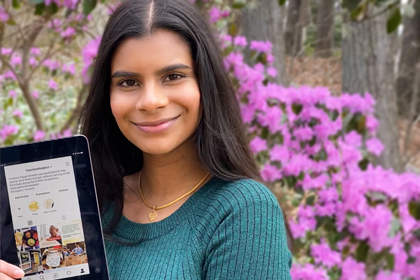The "COVID-19: The Larner Community Responds" series highlights stories about Larner College of Medicine students, faculty and staff who are answering the call for help during the COVID-19 pandemic.

Gia Eapen '22 helps to enlist community support for Frontline Foods through social media, particularly Instagram
The "COVID-19: The Larner Community Responds" series highlights stories about Larner College of Medicine students, faculty and staff who are answering the call for help during the COVID-19 pandemic.
With clinical clerkships on hold thanks to the COVID-19 pandemic, Larner College of Medicine students Gia Eapen ’22 and Sylvia Lane ’22 needed a way to feel useful. The LCOMcares Service Corps, a group of faculty, staff and students formed to help the community through this public health crisis, introduced them to Frontline Foods, a national organization that’s uniting hospitals with area restaurants to feed healthcare workers. Eapen and Lane are now in charge of marketing for Frontline Foods’ Vermont chapter.
A grassroots initiative, Frontline Foods launched in mid-March in San Francisco when entrepreneur Frank Barbieri texted a friend who’s an emergency room nurse at UCSF Medical Center at Mission Bay to offer help. The nurse suggested he buy dinner for her colleagues in the emergency department. Instead, Barbieri made a grander plan, teaming area restaurants that are suffering economically with hospitals whose staffs are so overworked and stressed by the pandemic that they don’t have time or energy to sit down and eat. It’s a community-focused effort that spread nationwide rapidly and uses financial donations to pay local restaurants to prepare individually packaged meals that are then transported to area hospitals. Meals cost about $20 each; generally, 50 are provided by one restaurant at a time.
Participating restaurants are The Great Northern and Restaurant Poco in Burlington, and The Blank Page Café at Bread and Butter Farm in Shelburne. Any restaurant that would like to get involved is invited to fill out an online form indicating availability and the number and kinds of meals they can provide.
“Our team is trying to make sure that we’re giving this opportunity to restaurants who need work—restaurants who maybe don't have a takeout opportunity right now,” says Lane. That way, healthcare workers are being fed while the restaurants are getting a much-needed economic boost.
Registered nurse Sheramy Tsai helped bring the idea to Vermont.
“As we thought about the team we needed to get this off the ground, we looked to the [Larner] College of Medicine. Knowing that it has so many bright individuals who are also going through major adjustments as their educational plans have changed, we wanted to tap that resource,” says Tsai. In particular, she needed help with marketing and social media. Lane is drawing on past experience using Facebook ads to market research she’s worked on, while Eapen, who has more than 2,600 Instagram followers, is leveraging her familiarity with that platform, along with others.
“Sylvia and Gia have been instrumental in our efforts,” says Tsai. “They bring great energy and are motivated to make a big difference in this world.”
Although the team is focusing for the moment on UVM Medical Center and Chittenden County eateries, restaurants elsewhere have expressed interest in participating. “If there's capacity, I think there could be potential to expand around the state,” Eapen says. “The best way people can get involved right now is donate, if you're able. And if you're not, share the initiative with as many people in Vermont as you can.” Because the national organization has no overhead, local donations stay in-state.
“Everything that is donated in Vermont comes back to local Vermont restaurants,” says Lane.
Frontline Foods has partnered with World Central Kitchen, a 501(c)(3) organization, so all donations are tax deductible. Volunteers to help transport food from the restaurants to the hospital will also be needed in the near future.